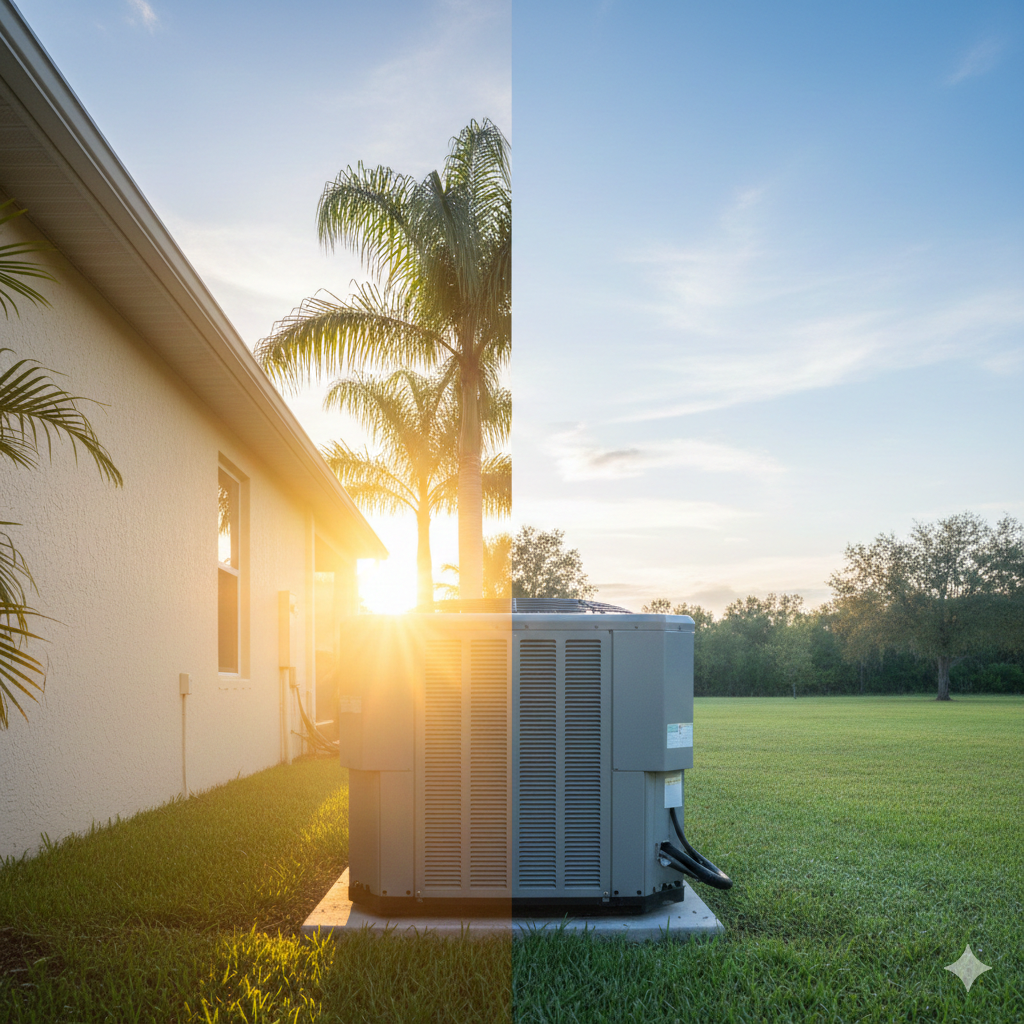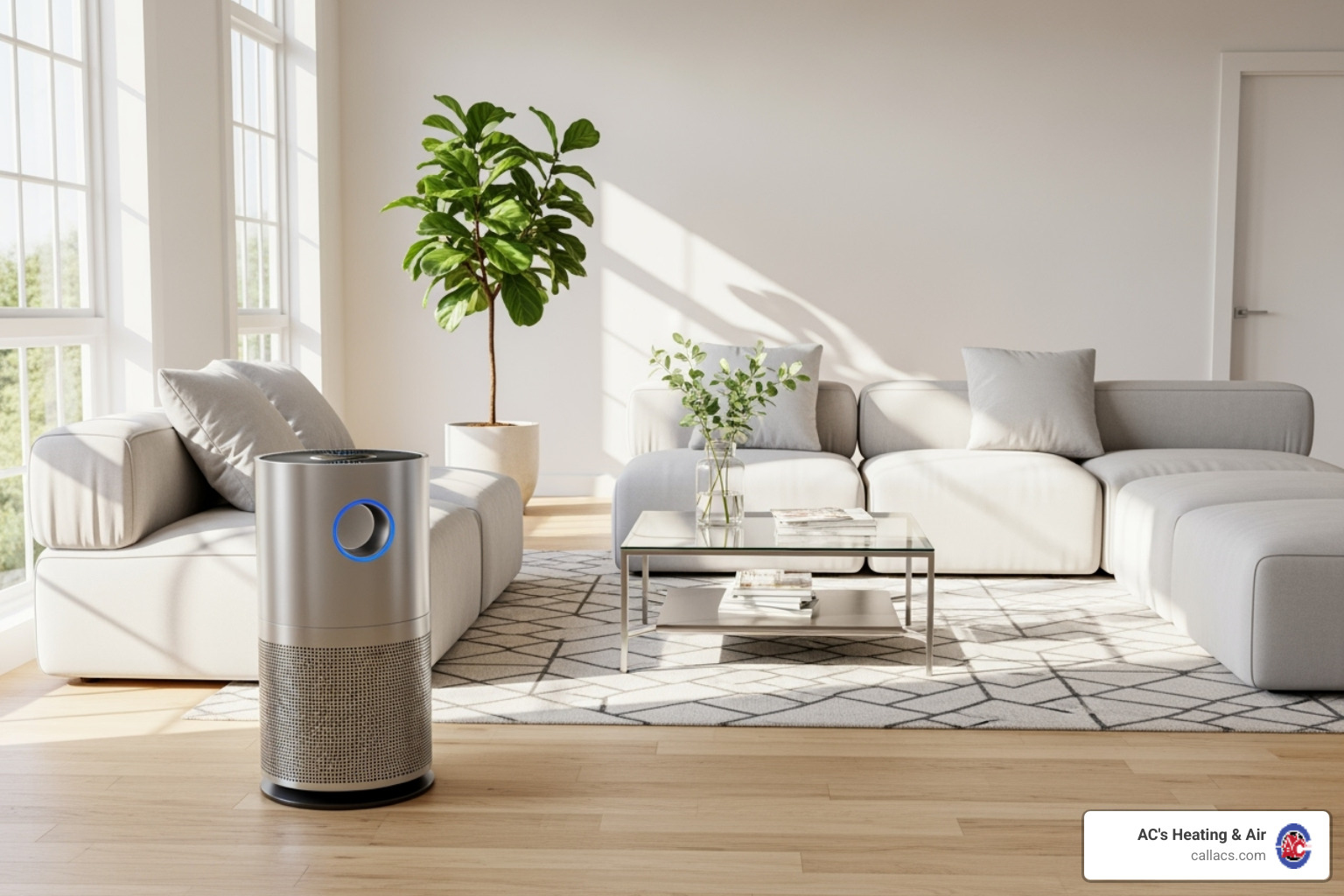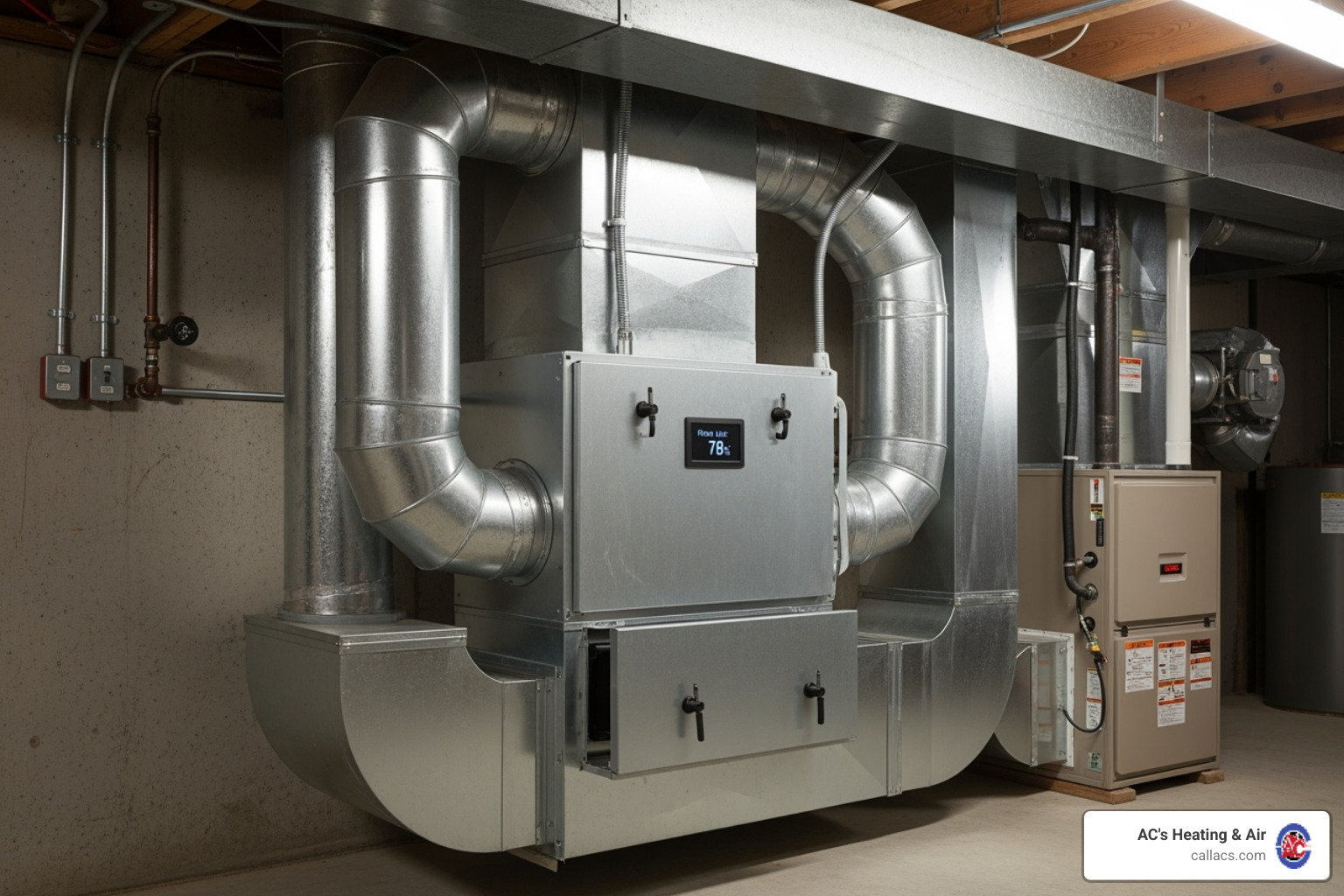Beat the Heat: Maximize Your AC's Efficiency

Maximize Your Home's A/C Efficiency Year-Round
Air conditioning efficiency tips are not just about achieving a more comfortable indoor climate; they are also crucial for cutting down on hefty cooling costs. By implementing a few straightforward changes, you can improve your AC's performance and, in the long run, give your wallet some much-needed relief. Here's a quick overview of essential tips to get you started:
- Keep AC filters clean: Regular cleaning or replacement can significantly improve airflow.
- Optimize thermostat settings: Setting your thermostat to 78 degrees Fahrenheit in summer is ideal for balancing comfort and efficiency.
- Seal any air leaks: Check windows and doors to prevent cool air from escaping.
- Ensure proper insulation: Well-insulated ductwork can improve efficiency.
- Schedule routine maintenance: Professional check-ups can catch issues early, ensuring smooth operation.
Implementing these simple strategies can make a substantial difference in both comfort and energy bills.
As the owner of AC's Heating & Air, I'm Allen Chenault. With 10+ years in the HVAC industry, I’ve gathered extensive expertise on air conditioning efficiency tips that can help you transform cooling practices and, ultimately, balance comfort with economy. In the upcoming sections, we'll dig deeper into actionable steps to maximize your AC's efficiency.

12 Tips for Air Conditioning Efficiency
Let's explore some practical tips to boost your air conditioner's efficiency. These strategies not only improve comfort but also help you save on energy bills.
1. Keep Vents Clean and Unblocked
Blocked vents can make your AC work harder than it needs to. Make it a habit to dust or vacuum vents regularly. Ensure no furniture or blinds are obstructing them. This small step can improve airflow and cooling efficiency.
2. Change the Air Filter Regularly
A dirty air filter can choke your AC system. Replace filters every one to three months, or as recommended by the manufacturer. This simple action improves air quality and helps your AC run smoothly.
3. Clean the Outdoor Unit
Your AC's outdoor unit can get clogged with debris like leaves and dirt. Check it regularly and clear away any obstructions. If needed, shade the unit to prevent overheating, especially during summer.
4. Clear the Drain Line
A clogged drain line can lead to water damage and reduce efficiency. Pour a cup of chlorine bleach down the AC drain and flush it with water to keep it clear, especially during peak usage months.
5. Close Doors and Windows
Leaving doors and windows open lets cool air escape, wasting energy. Keep them closed when the AC is on to maintain indoor comfort and efficiency.
6. Limit Use of Heat-Generating Appliances
On hot days, avoid using appliances like ovens or hair dryers. They add heat to your home, making your AC work harder. Try to use these appliances during cooler times of the day.
7. Mind the Thermostat Location
Place your thermostat away from heat sources like lamps or direct sunlight. An inaccurate reading can lead to unnecessary cooling cycles, increasing energy costs.
8. Install Window Coverings
Curtains or blinds can block out heat from direct sunlight. Close them during the hottest parts of the day to keep your home cooler and reduce the load on your AC.
9. Seal Air Leaks
Air leaks around windows and doors can let cool air escape. Use caulk or weather stripping to seal these gaps. This simple fix can significantly improve efficiency.
10. Adjust Thermostat Temperature
Set your thermostat to 78 degrees Fahrenheit when you're home and higher when you're away. This balance keeps you comfortable while optimizing energy use.
11. Insulate Ductwork
Exposed ductwork in unconditioned spaces can leak cool air. Insulating these ducts ensures that more cool air reaches your living areas, enhancing efficiency.
12. Schedule Regular Maintenance
Routine maintenance by a professional can catch potential issues early and keep your system running smoothly. Regular check-ups are essential for long-term efficiency.

By following these air conditioning efficiency tips, you can enjoy a cooler home and lower energy bills. Next, we'll explore how programmable thermostats can further improve your energy savings.
Programmable Thermostats and Energy Savings
Programmable thermostats are a game-changer when it comes to boosting your home's energy efficiency. These handy devices allow you to set specific temperature schedules, ensuring that your air conditioner only runs when needed. This not only saves energy but also reduces your electricity bills.
Why Use a Programmable Thermostat?
A programmable thermostat lets you preset temperatures for different times of the day. For instance, you can set it to cool your home just before you arrive from work and let it rest when you're away. This way, you avoid unnecessary energy consumption without sacrificing comfort.

Smart Thermostat Features
Modern smart thermostats come with advanced features that make them even more efficient. Wi-Fi connectivity allows you to control your thermostat remotely via a smartphone app. This means you can adjust your home's temperature from anywhere, anytime.
Geofencing is another cool feature that uses your phone's location to determine when to activate your AC. If you're nearing home, the thermostat can automatically start cooling, ensuring comfort upon arrival.
Optimal Thermostat Settings
For optimal energy savings, the U.S. Department of Energy recommends setting your thermostat to 78°F when you're home and need cooling. If this feels too warm, start at a higher temperature and gradually adjust to find your comfort spot.
Also, consider using energy-saving modes available in many smart thermostats. These modes learn your schedule and adjust temperatures accordingly to maximize savings.
Energy Savings in Numbers
Switching to a programmable thermostat can lead to significant savings. According to the U.S. Department of Energy, you could save up to 10% a year on heating and cooling by simply adjusting your thermostat by 7°-10°F for 8 hours a day from its normal setting.
By integrating a programmable thermostat into your home, you take a big step toward more efficient energy use and lower utility bills. Up next, we'll discuss the importance of regular maintenance to keep your HVAC system running smoothly.
Importance of Regular Maintenance
Keeping your HVAC system in tip-top shape is crucial for maximizing efficiency and extending its lifespan. Regular maintenance ensures your air conditioning unit runs smoothly, saving you from unexpected breakdowns and high repair costs.
Annual Inspections
Scheduling annual inspections is a simple yet effective way to keep your HVAC system healthy. During these inspections, a professional technician will check all components, including the refrigerant levels, electrical connections, and moving parts. They will also clean the coils and ensure everything works as it should.
Why is this important? Regular inspections can catch small issues before they become big problems, helping to avoid costly repairs. Plus, a well-maintained system runs more efficiently, which can lower your energy bills.
Preventative Maintenance
Preventative maintenance goes hand-in-hand with annual inspections. This includes routine tasks like changing air filters, clearing drain lines, and cleaning air ducts.
- Air filters should be replaced every 30-90 days, depending on your home's conditions. Dirty filters block airflow and make your system work harder, reducing efficiency.
- Drain lines need to be kept clear to prevent water backup, which can lead to efficiency issues. Pouring a cup of chlorine bleach down the AC drain and rinsing it with water can help keep it clear.
- Air ducts should be cleaned to ensure good airflow and air quality. Dust and pet hair can accumulate, leading to various issues.
The bottom line? Regular preventative maintenance helps your AC system run efficiently, keeps your home comfortable, and can even extend the life of your unit.
HVAC System Longevity
A well-maintained HVAC system can last anywhere from 15 to 25 years. However, neglecting regular maintenance can significantly shorten its lifespan. Think of it like caring for a car; regular oil changes and tune-ups keep it running longer.
Pro Tip: Schedule regular maintenance and inspections to ensure your system reaches the upper end of its lifespan. This not only saves money on replacements but also ensures reliable cooling for your home.
By staying on top of your HVAC system's maintenance, you ensure it's always ready to keep you cool and comfortable. Next, we'll tackle some frequently asked questions about air conditioning efficiency tips.
Frequently Asked Questions about Air Conditioning Efficiency Tips
Is it cheaper to run an air conditioner all the time?
When it comes to energy efficiency, running your air conditioner constantly might seem convenient, but it's not the most cost-effective strategy. The key is to use your AC smartly to manage electricity usage.
Fact: Keeping your AC on all the time can lead to higher energy bills. Instead, try using a programmable thermostat to set specific times for the AC to run. This way, it operates only when needed, saving energy and money.
How can I make my AC work more efficiently?
Making your AC more efficient involves a few simple cooling strategies:
- Set the Thermostat Wisely: Adjust your thermostat to a comfortable yet efficient setting. A programmable thermostat can automatically change temperatures based on your schedule, reducing unnecessary usage.
- Use Ceiling Fans: Fans can help circulate cool air, allowing you to set the AC at a higher temperature without sacrificing comfort.
- Seal Air Leaks: Ensure windows and doors are sealed properly to prevent cool air from escaping. This keeps your home cooler and reduces the workload on your AC.
- Regular Maintenance: As highlighted earlier, routine maintenance like cleaning air filters and checking refrigerant levels ensures your AC runs efficiently.
What temperature should I set my AC to in the summer?
Finding the ideal temperature for your home can significantly impact energy savings. According to the U.S. Department of Energy, setting your thermostat to 78°F when you're home and need cooling is optimal for balancing comfort and efficiency.
Pro Tip: If 78°F feels too warm, start at a higher setting and gradually lower it until you find a comfortable balance. Every degree you raise the thermostat can save up to 10% on cooling costs.
By understanding and implementing these air conditioning efficiency tips, you can enjoy a cooler home without the hefty energy bills. Next, we'll wrap up with insights into how AC's Heating & Air leverages its HVAC expertise to serve Central Florida.
Conclusion
At AC's Heating & Air, we understand the unique challenges that come with keeping your home comfortable in the Central Florida climate. Our HVAC expertise is custom to meet the needs of our community, ensuring that every home we service benefits from optimal efficiency and comfort.
Our team specializes in the installation, repair, and maintenance of heating and cooling systems, providing personalized solutions that improve system performance while reducing energy costs. Whether you're in Apopka, Winter Park, Orlando, or any other part of Central Florida, our experienced technicians are dedicated to delivering top-notch service.
We believe that regular maintenance and smart system usage are key to maximizing your air conditioner's efficiency. Our custom HVAC maintenance plans are designed to keep your system running smoothly year-round, preventing costly breakdowns and extending the lifespan of your equipment.
For those in the Apopka area, we invite you to explore our services further. Our commitment to excellence ensures that you'll receive the best care and advice for your HVAC needs. Visit our Apopka service page to learn more about how we can help you beat the heat and enjoy a more efficient air conditioning system.
By choosing AC's Heating & Air, you're not just getting a service provider—you're gaining a partner in maintaining a comfortable, energy-efficient home. Let us help you make the most of your air conditioning system, ensuring that you stay cool and save money all year long.



